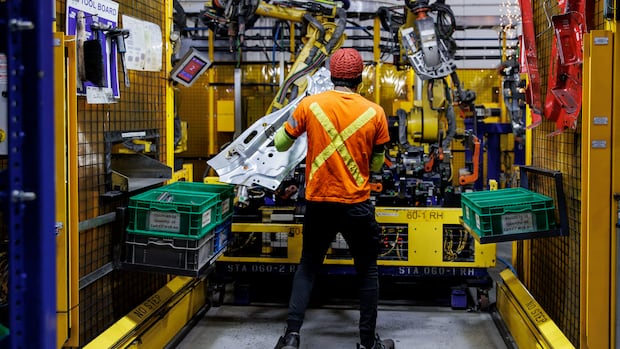As Air Canada cancelled flights on Thursday ahead of a possible flight attendants’ strike, the union representing those workers accused the federal jobs minister of speaking “on behalf” of the company amid a contentious labour dispute.
“Every party has expressed support for our effort to end unpaid work except for the governing Liberal Party,” Wesley Lesosky, the president of the Canadian Union of Public Employees’ Air Canada component, said during a news conference.
CUPE national president Mark Hancock said that after the union presented several wage offers to Air Canada, federal Jobs Minister Patty Hajdu “brought a ‘no’ from Air Canada to the bargaining table.”
“I’ve been doing this for a long time, dealt with different types of governments across this country, and not once have I seen a minister reply on behalf of a company,” said Hancock.
- Cross Country Checkup is asking: How will you be affected by an Air Canada strike? What should be done about it? Leave your comment here and we may read it or call you back for our show this afternoon.
Earlier Thursday, Hajdu said she asked the Canada Union of Public Employees to respond to the airline’s request for binding arbitration. Air Canada officials confirmed that they asked the federal government to intervene if a deal does not materialize.
“I have met with both parties throughout the bargaining process and strongly urged them to come to an agreement,” Hajdu wrote on social media platform X.
“Air Canada submitted a request that I make a referral under Section 107 of the Canada Labour Code to send the parties to binding arbitration. I have asked the union to respond to the employer’s request.”
CBC News is reaching out to the minister’s office for comment.
Earlier this week, Air Canada sent a proposal to CUPE that the parties use binding interest arbitration to come to an agreement as they negotiate the renewal of a 10-year collective agreement for more than 10,000 flight attendants.
CUPE declined to use arbitration, a process in which an outside arbitrator would hear proposals from each side about specific agenda items that haven’t been agreed upon and then make a decision that would bind both parties.
At a news conference, Air Canada’s chief operations officer Mark Nasr detailed the airline’s plans for gradual flight suspensions ahead of a potential strike by flight attendants Saturday morning. Several dozen cancellations are expected by the end of Thursday and about 500 by the end of Friday, he said.
‘Air Canada walked away,’ CUPE president says
CUPE held its own news conference just a few hours after Air Canada officials spoke to the media in Toronto, outlining the airline’s plan to gradually suspend flights until a complete shutdown on Saturday.
The airline’s conference was cut short by its communications officer after several CUPE members entered the room holding up signs bearing slogans like: “Unpaid work won’t fly.”
Lesosky said that the union is trying to “end the abuse of unpaid work by this company,” reiterating that its members are struggling to pay rent and buy basic groceries.
Several CUPE representatives have said that Air Canada hasn’t been at the negotiating table since Tuesday evening.
“Air Canada walked away when we entertained wages, unpaid work and very minor other detailed items. So those two big items seem to be the catalysts that has [led] them to walk away,” Lesosky said.
500 flight cancellations expected by Friday evening
Air Canada officials said during their news conference on Thursday morning that the union made the last few days of negotiations “meaningless” by making “unsustainable offers.”
The airline started cancelling flights Thursday morning, particularly “long-haul international flights due to depart tonight,” chief operations officer Mark Nasr said, alongside chief human resources officer Arielle Meloul-Wechsler.
The cancellations will keep going and “grow in magnitude,” Nasr said, with Air Canada expecting to cancel several dozen flights on Thursday and about 500 flights by Friday evening, affecting more than 100,000 customers.
All flights will be paused by Saturday morning, with the work stoppage slated to officially start just before 1 a.m. ET that day.
Henly Larden, an Air Canada flight attendant and the vice-president of CUPE 4094, says flight attendants work an average of 35 unpaid hours per month related to duties performed during boarding and deplaning. This comes as Air Canada flight attendants rallied outside major airports on Monday as part of a national day of action to protest low pay and unpaid work.
Canadian travellers have been anxiously awaiting news of cancelled flights. As of 2:30 p.m. ET, the flight-tracking website FlightAware showed nine Air Canada flights departing on Thursday had been cancelled.
The airline also cancelled seven flights and budget airline Air Canada Rouge cancelled three flights scheduled for Friday.
Why negotiations reached an impasse
Among the sticking points in negotiations are wages and something called “ground pay,” which covers the work that flight attendants do before boarding and after deplaning, including safety procedures and assisting passengers.
WATCH | A flight attendant explains what ground pay means:
The union says Air Canada offered an eight per cent wage increase in the first year of a four-year deal, while Air Canada said it offered the union a 38 per cent increase in total compensation (which includes wages and benefits) over four years, with a 25 per cent increase in the first year. The union maintains it hasn’t seen such an offer.
The airline proposed ground pay at 50 per cent of a flight attendant’s hourly rate, according to CUPE’s Air Canada component. The union declined the proposal and is asking for ground work to be paid at 100 per cent.







